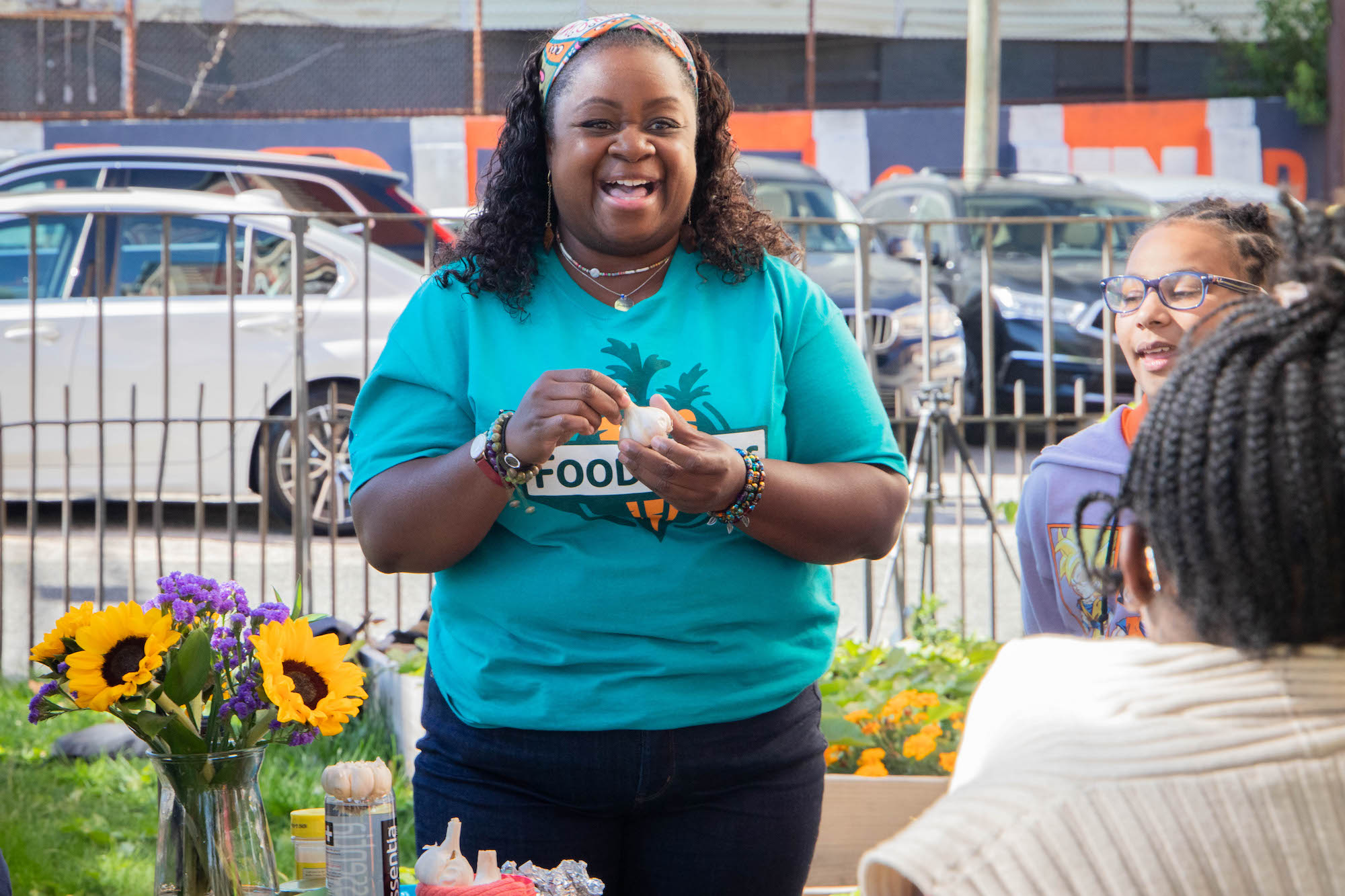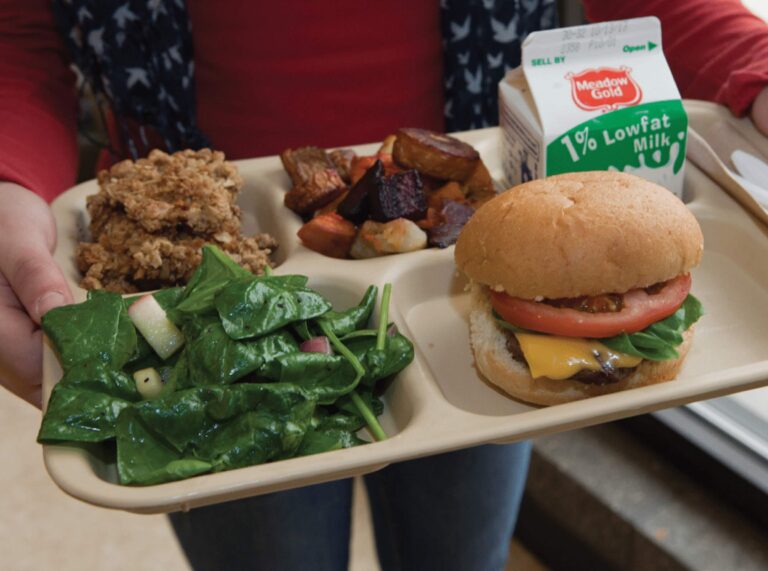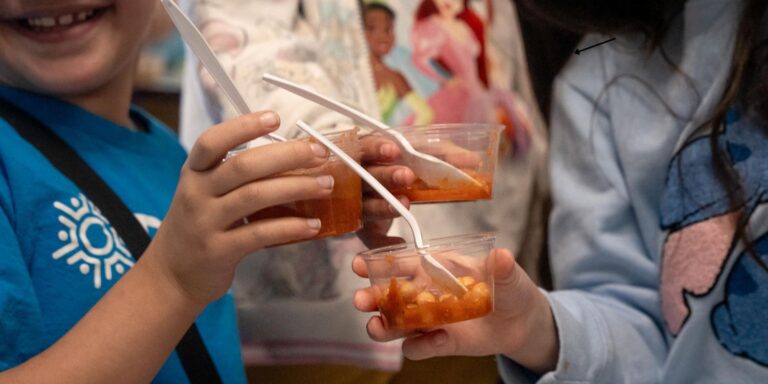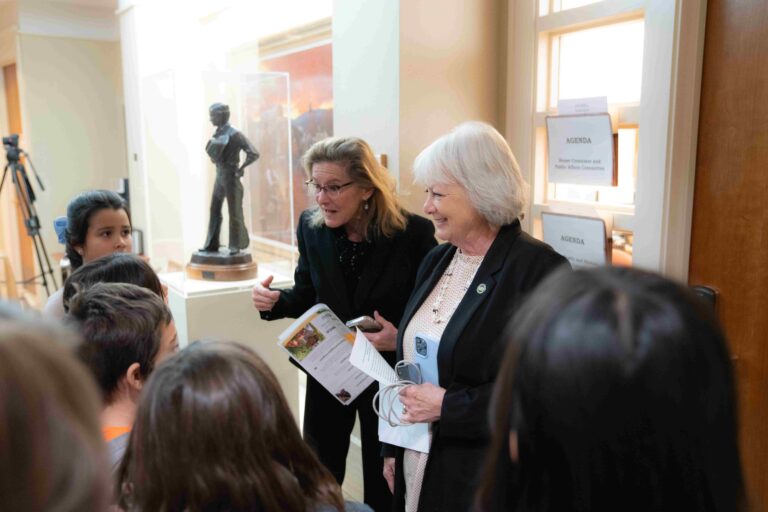“Newark Chose Me”: A Talk with Bridgette Byrd
How one New Jersey service member connects to her city through food.
Join our corps! Applications for 2026-2027 are now open. Apply by March 30.
How one New Jersey service member connects to her city through food.

Bridgette Byrd will be the first to tell you about the importance of place.
As a FoodCorps service member in Newark, New Jersey, Bridgette is deeply tuned into her community, from celebrating the city’s food culture to uplifting her students’ voices and experiences. While her lessons spotlight local ingredients, like Jersey-grown sweet potatoes, she also teaches about the history of the land and the Indigenous peoples who lived there first.
“As we commemorate the lives of Indigenous peoples and Black leaders, I shared the gift of food with all my students, just as my grandmother shared her gift of food with me in my childhood years,” Bridgette told FoodCorps.
We sat down with Bridgette to learn about her connections to Newark, food, and her students. Read on to learn more about her service.
FoodCorps: Why did you apply to be a FoodCorps service member?
Bridgette Byrd: I applied because of my love for food and healthy meals that nourish underserved communities with limited access to whole, sustainable foods for the family. My love for cooking nutritious meals while learning foodways connected me to friends, family and community. I watched my father, a self-taught chef, work magic in the kitchen with various food items that were freshly selected and prepared with love. At times, I personally enjoyed working alongside him as his personal sous chef in our kitchen or in his work kitchen. I learned techniques and strategies about food selection, preparation, and preservation from my father. I never knew I would come to this point of my life and connect food with environmental justice and food security in the Newark community.
How would you describe your relationship with Newark? What made you want to serve here?
For the last six years, I was a student at Rutgers University enrolled in the undergraduate Psychology program. During my commute I embraced the cultural differences within the city’s food markets, restaurants, and community members within its four wards. There’s a variety of outdoor street markets with fresh foods and a busy historic downtown shopping district. All things are tied to food through Newark community activities. As foodways are an integral part of every lifestyle, urban agriculture must also reside within these concrete landscapes so that food is accessible for all residents within the surrounding community.
Experiencing the sights and sounds made me realize we have an obligation to expand green spaces in order to feed people facing food insecurity and who lack the essentials, like access to fresh fruits and vegetables. Newark is a vibrant city, with a vibrant arts scene of murals and historical buildings that merge the old and the new celebrating its rebirth. This makes this city a special place to visit, work, or attend school like I did. But underserved residents voice common concerns like food insecurity. During the pandemic, data revealed the disproportionate effects on poor communities who lack basic essentials. Many people encountered new threats when faced with having to choose between utility bill payments and feeding their family. As these pains were voiced it exposed urban disparities, as many outcomes of poor health were related to food insecurity. This motivated organizations, churches, and institutions to advocate on behalf of community members who are often overlooked.
I wanted to share my knowledge from my years of experience as a researcher in the Well-Being Lab at Rutgers University and empower Newark residents through education and public service. I realized that too often, the ugly details overshadow the beauty and the resilience of the people, and I wanted to represent Newark and its residents in a different light. I felt that if there was one community that I wanted to work in and serve, it would be the city of Newark. To be a change agent, to be an environmental steward, and to also bring awareness around the beauty and the culture and help to build this city. By doing that, I can help empower populations and families that are here. I feel I chose Newark, but Newark also chose me.
What’s one thing that you really celebrate about this city?
There is a richness in this community, and you see it through the diversity of people and populations that reside here. You see it expressed in art. You see it expressed in music. You see it when you walk throughout the neighborhoods and see the sights or hear the sounds. It’s sensory overload, yet invigorating. The smell of different foods appeals to the senses. It’s rich and worth investigating. I celebrate the city as a landmark because of its ties to native ancestral roots. It’s a phenomenal place that connects land, people and culture.
Can you describe one of your recent lessons?
Today we worked with a cool-weather crop as students learned the origin and history of garlic. I wanted students to understand, first of all, what a crop is. We talked about how crops grow in certain climates and regions based on the conditions. I think being in a densely populated city of around 300,000, space constraints become a major concern, so I’m demonstrating ways in which food can be grown indoors or outdoors. I was able to show the different variations and characteristics of a garlic bulb by its outer skin, a sheath, how cloves are separated and planted individually and the top vs. bottom parts that make up that bulb. After discovering the garlic properties they experienced a hands-on demonstration as each student dug out an area in the plot to plant an individual garlic clove.
How do you incorporate wellness or mindfulness activities as you’re creating your lessons?
I want people to be aware of their perceptions of food; for instance, what you visually notice, how it smells using descriptive words, and what your taste buds recognize during a tasting. There’s a whole sensory experience that forms food memories. Sometimes our food experience is not cherished; actions and behaviors go unnoticed when we deny ourselves time spent enjoying food and the company of others. What we do is sit down, we quickly eat, and then we’re off to the next thing, but we need to sit with our food and experience it. I’m big on conscious consumption, and to me that’s being aware of how you’re feeling in the moment with food and your perceptions of how food speaks to you.
Is there anything else you’d like to share?
During the last three years, we all experienced challenges that left us socially and emotionally deprived of life; this taught us to adapt in order to survive. Food is an integral part of our survival. Without the right foods our society will face unnecessary health disparities that can easily be avoided with sustainable practices and resources. My contributions as a FoodCorps service member involve my expertise and public service specifically within communities of color to nourish and empower whole bodies as we work to nourish whole communities. I can connect students to beautiful experiences with whole foods through education and service.
Answers have been edited for clarity and brevity. Thanks to the Walmart Foundation for its support of FoodCorps’ culturally relevant food education work.

3 Reasons We Need School Meals for All

Mindful Tasting: Eating with All 5 Senses

Our 2025 Child Nutrition Policy Year in Review